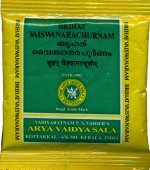Paushkara, Pauṣkara: 15 definitions
Introduction:
Paushkara means something in Hinduism, Sanskrit, biology. If you want to know the exact meaning, history, etymology or English translation of this term then check out the descriptions on this page. Add your comment or reference to a book if you want to contribute to this summary article.
The Sanskrit term Pauṣkara can be transliterated into English as Pauskara or Paushkara, using the IAST transliteration scheme (?).
In Hinduism
Purana and Itihasa (epic history)
Source: Cologne Digital Sanskrit Dictionaries: The Purana IndexPauṣkara (पौष्कर).—The blue colour; of Viṣṇu (Prādurbhāva).*
- * Matsya-purāṇa 171. 64 and 70.

The Purana (पुराण, purāṇas) refers to Sanskrit literature preserving ancient India’s vast cultural history, including historical legends, religious ceremonies, various arts and sciences. The eighteen mahapuranas total over 400,000 shlokas (metrical couplets) and date to at least several centuries BCE.
Shaivism (Shaiva philosophy)
Source: academia.edu: Religious Inclusivism in the Writings of an Early Modern Sanskrit Intellectual (Shaivism)Pauṣkara (पौष्कर) or Pauṣkarāgama is said to be a subsidiary (upabheda) of the Pārameśvara, itself one of the 28 tantras or āgamas recognized as authoritative by Śaivas. Note: Some scholars believe that this Pauṣkara is not the ‘original’ one but a later South Indian redaction that was unknown to Saiddhāntikas of old such as Bhaṭṭa Rāmakaṇṭha (cf. Goodall 2004: li–lii); other scholars do not doubt the authenticity of the Pauṣkara (cf. Colas-Chauhan 2007: 10–12).

Shaiva (शैव, śaiva) or Shaivism (śaivism) represents a tradition of Hinduism worshiping Shiva as the supreme being. Closely related to Shaktism, Shaiva literature includes a range of scriptures, including Tantras, while the root of this tradition may be traced back to the ancient Vedas.
Vastushastra (architecture)
Source: archive.org: Bharatiya vastu-sastraPauṣkara (पौष्कर) or Pauṣkaratantra is the name of a Tantra authored by Vibhava: an ancient teacher (ācārya) of Vāstuśāsta (science of architecture) according to the Vibhava.—All these great teachers cannot be said to be legendary. Some used to be propagated in ancient India. No nation can flourish without its care for its material prosperity. All this technique and training and their systematic and successful teaching and transmission were of equal importance. Most of the treatises of Vāstuśāstra carry many of these names [i.e., Puṣkara—Pauṣkara-tantra], yet a good many of them are quoted as authorities, yet still others are honoured with actual passages being quoted from their works.

Vastushastra (वास्तुशास्त्र, vāstuśāstra) refers to the ancient Indian science (shastra) of architecture (vastu), dealing with topics such architecture, sculpture, town-building, fort building and various other constructions. Vastu also deals with the philosophy of the architectural relation with the cosmic universe.
Biology (plants and animals)
Source: Wisdom Library: Local Names of Plants and DrugsPauskara in the Sanskrit language is the name of a plant identified with Inula royleana DC. from the Asteraceae (Sunflower) family. For the possible medicinal usage of pauskara, you can check this page for potential sources and references, although be aware that any some or none of the side-effects may not be mentioned here, wether they be harmful or beneficial to health.
Pauskara [पौष्कर] in the Sanskrit language is the name of a plant identified with Inula racemosa Hook. f. from the Asteraceae (Sunflower) family.
Source: Google Books: CRC World Dictionary (Regional names)Paushkara in India is the name of a plant defined with Cheilocostus speciosus in various botanical sources. This page contains potential references in Ayurveda, modern medicine, and other folk traditions or local practices It has the synonym Banksea speciosa J. König (among others).
Example references for further research on medicinal uses or toxicity (see latin names for full list):
· Revisio Generum Plantarum (1891)
· Botanische Jahrbücher für Systematik, Pflanzengeschichte und Pflanzengeographie (1899)
· Queensland Agricultural Journal (1898)
· Observationes Botanicae (1791)
· Costoideae.
· The Flora of British India (1890)
If you are looking for specific details regarding Paushkara, for example chemical composition, side effects, health benefits, diet and recipes, extract dosage, pregnancy safety, have a look at these references.

This sections includes definitions from the five kingdoms of living things: Animals, Plants, Fungi, Protists and Monera. It will include both the official binomial nomenclature (scientific names usually in Latin) as well as regional spellings and variants.
Languages of India and abroad
Sanskrit dictionary
Source: DDSA: The practical Sanskrit-English dictionaryPauṣkara (पौष्कर).—(-rī, -kī f.) Relating to the blue lotus.
See also (synonyms): pauṣkaraka.
Source: Cologne Digital Sanskrit Dictionaries: Shabda-Sagara Sanskrit-English DictionaryPauṣkara (पौष्कर).—mfn.
(-raḥ-rī-raṃ) Relating to a pond, to a lotus, to fragrant Costus, &c. E. puṣkara, q. v., aṇ aff.
Source: Cologne Digital Sanskrit Dictionaries: Benfey Sanskrit-English DictionaryPauṣkara (पौष्कर).—i. e. puṣkara + a, I. adj., f. rī. 1. Relating to the blue lotus. 2. Consisting of its flowers, [Harivaṃśa, (ed. Calc.)] 9437. 3. Relating to the Costus speciousus. Ii. n. The fruit of the Costus speciosus.
Source: Cologne Digital Sanskrit Dictionaries: Aufrecht Catalogus Catalogorum1) Pauṣkara (पौष्कर) as mentioned in Aufrecht’s Catalogus Catalogorum:—from Śaivāgama. Mysore. 4. Quoted by Rāmakaṇṭha in Nareśvaraparīkṣā.
—[commentary] by Umāpatiśivācārya. Mysore. 3.
2) Pauṣkara (पौष्कर):—Quoted by Hemādri in Pariśeṣakhaṇḍa 2, 292.
3) Pauṣkarā (पौष्करा):—Quoted by Utpala in Spandapradīpikā p. 3.
Source: Cologne Digital Sanskrit Dictionaries: Monier-Williams Sanskrit-English Dictionary1) Pauṣkara (पौष्कर):—mf(ī)n. relating to or made of or connected with the blue lotus, [Mahābhārata; Harivaṃśa; Purāṇa]
2) (m. with or [scilicet] prādur-bhāva, ‘the appearance of Viṣṇu in the form of a lotus flower’ [Harivaṃśa])
3) relating to or derived from Costus Speciosus or C°
4) n. the root (with or sc. mūla) or fruit of C° Sp° or Arc, [Suśruta; cf. Lexicographers, esp. such as amarasiṃha, halāyudha, hemacandra, etc.]
5) Name of [work]
6) Pauskara (पौस्कर):—[wrong reading] for pauṣkara.
Source: Cologne Digital Sanskrit Dictionaries: Yates Sanskrit-English DictionaryPauṣkara (पौष्कर):—[(raḥ-rī-raṃ) a.] Belonging to a pond or to a lotus.
Source: DDSA: Paia-sadda-mahannavo; a comprehensive Prakrit Hindi dictionary (S)Pauṣkara (पौष्कर) in the Sanskrit language is related to the Prakrit word: Pokkhara.
[Sanskrit to German]
Sanskrit, also spelled संस्कृतम् (saṃskṛtam), is an ancient language of India commonly seen as the grandmother of the Indo-European language family (even English!). Closely allied with Prakrit and Pali, Sanskrit is more exhaustive in both grammar and terms and has the most extensive collection of literature in the world, greatly surpassing its sister-languages Greek and Latin.
Kannada-English dictionary
Source: Alar: Kannada-English corpusPauṣkara (ಪೌಷ್ಕರ):—
1) [noun] the plant Costus speciosus of Zingiberaceae family.
2) [noun] its root; mountain sweet flag.
3) [noun] the lotus plant Nymphaea nouchali ( = N. pubescens) of Nymphaeaceae family.
4) [noun] its flower.
Kannada is a Dravidian language (as opposed to the Indo-European language family) mainly spoken in the southwestern region of India.
See also (Relevant definitions)
Starts with: Paushkaragama, Paushkaraka, Paushkarasadi, Paushkarasamhita, Paushkaratantra.
Full-text (+6): Paushkaraka, Pokkhara, Paushkaratantra, Pauskaram, Paushkarasamhita, Paushkareyaka, Paushkarasadi, Paushkaragama, Paushkarini, Ishvarasamhita, Pautkaram, Bhinnanjana, Ratnatraya, Tattvatita, Acetana, Parinamin, Karana, Padmasamhita, Jayakhya-samhita, Satvatasamhita.
Relevant text
Search found 14 books and stories containing Paushkara, Pauṣkara, Pauskara, Pauṣkarā; (plurals include: Paushkaras, Pauṣkaras, Pauskaras, Pauṣkarās). You can also click to the full overview containing English textual excerpts. Below are direct links for the most relevant articles:
Brahma Sutras (Ramanuja) (by George Thibaut)
Sutra 2.2.42 < [Second Adyaya, Second Pada]
Expiatory Rites in Keralite Tantra (by T. S. Syamkumar)
2. Expiatory Rites in Vaiṣṇava Tantras < [Chapter 2 - Expiatory Rites in Āgamic Literature]
The Markandeya Purana (Study) (by Chandamita Bhattacharya)
Parama Samhita (English translation) (by Krishnaswami Aiyangar)
Pāñcarātra worship common in South Indian temples < [Introduction]
Pāñcarātra is Vaidika in character < [Introduction]
A History of Indian Philosophy Volume 3 (by Surendranath Dasgupta)
Part 3 - The Pañcarātra Literature < [Chapter XVI - The Pañcarātra]
Part 4 - Philosophy of the Jayākhya and other Saṃhitās < [Chapter XVI - The Pañcarātra]
The Agni Purana (by N. Gangadharan)
Related products


